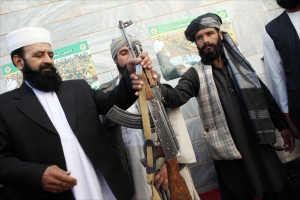 BLUF: In modern conflict one only wins if they are able to achieve affects militarily, socially, culturally and politically.
BLUF: In modern conflict one only wins if they are able to achieve affects militarily, socially, culturally and politically.
The later three are mostly ignored in most modern conflict endeavors. Our training, both military and Department of State, has no capacity to teach/train our people how to win this fight.
As I write these blogs, I’m often asked to comment on stories that are published. I understand why, much of what you hear isn’t clear or told in a manner that truly conveys the whole story. This is normal…and to be expected. In this week’s blog I’ve been ask to comment on https://soundcloud.com/bbc-world-service/afghan-taliban-not-as-big-a
First, the Taliban is likely losing battles. However, the interviewer is correct in doubting the long-term success. The enduring capability of the Afghan police and military are yet to be determined.
My experience tells me that long term growth for the military is possible; however, progress thus far is rather difficult to measure. Keep in mind we are well past 10 years into this endeavor. Ten years of teaching and training should net a pretty significant level of competence…should. However, this doesn’t seem to be the case in most of Afghanistan. Why? That is another blog post…
Second, a critical point is raised in the interview. The local Taliban leaders are from the region. This leaves an indelible mark on the perception of the populace. We have to also realize that this makes the Taliban leaders local or family. Family means survival.
Also, the Taliban were the government before our arrival. If they are still there and exerting power, what has changed for the populace? In Helmand after 10 plus years of fighting, if the Taliban leaders are still there, still wielding power, are they not the local government? Haven’t they proven, to the locals that they will always remain in power?
Even if the Taliban have fled certain areas, the long term security is doubted by locals. Why? We have to go back to capacity. The ability of the police to arrest, try and convict is not sufficient to warrant any confidence from Afghans. When we get to the “ground truth” we see a police force that doesn’t itself believe it can put people in jail. One of things I hope we’ve learned in both Iraq and Afghanistan is that simply arresting people in hopes of gaining some sort of stability is folly.
Actually this practice of knocking in doors and arresting “criminals” only to release them creates anger with the populace. This anger begets more bombs. We’ll cover more on this topic in another blog.
Forget the capacity of the police and Afghan army. The Taliban, while not desirable, is the leading force in the region and in many others of Afghanistan. Now what do we do to change that?
Let’s look at this from another angle. What does the government effectively do for the population? If the governor is able to provide services, it’s possible they will eventually accept Afghan governmental (known as GIRoA) rule as dominant. If the local government is failing, then it’s highly unlikely that they are seen as anything more than puppets.
In most cases, the government does little if anything at all for the people. I’ve talked to farmers and villagers; they do not see GIRoA as an effective government. Also, many families (again Family = survival) are self governing. They ensure they have water, food and work. There isn’t a rural family in Afghanistan that has survived without family/tribal support. Now…go find me a rural family that survives because of GIRoA support.
Waiting….
It takes years to eventually make a government “legitimate” with its people. Our training does little (and that’s kind) to promote the social movement of the population towards the government. By not focusing early on this factor, we’ve done little to help our partners establish a government of, for and by the people. We are great at putting the pieces together, building a fledgling government. Our ability to see this strategic vision is tremendous. However, it’s a government with no foundation.
Finally, if the government is in active talks with the Taliban, isn’t it safe for locals to assume that Taliban influence is going to remain in their region? If family = survival. If family = Taliban. If the government is fighting the Taliban…what is our expected outcome?
Still waiting…
